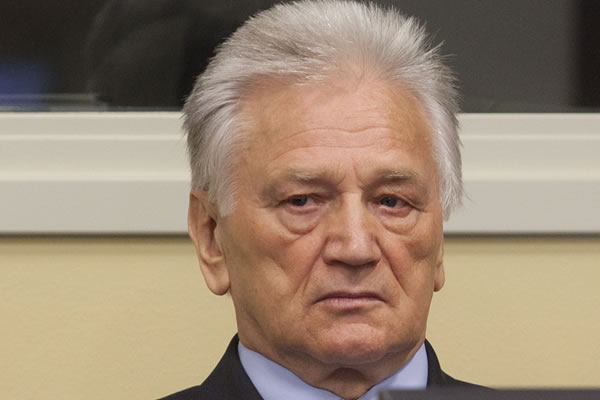Home
DEFENSE: PERISIC’S JUDGMENT IS FINAL
In a response to the prosecution’s request for the reconsideration of Momcilo Perisic’s acquittal, the defense notes that the Appeals Chamber ‘doesn’t have the power to reconsider a final judgment’. The defense concludes that the prosecution has failed to present legally sound arguments or any basis that would allow the reconsideration
 Momcilo Perisic in the courtroom
Momcilo Perisic in the courtroom Insisting that Momcilo Perisic’s judgment is ‘final’, the defense of the former chief of the Yugoslav Army General Staff has urged the Appeals Chamber to deny the prosecution’s motion for reconsideration. In March 2013 Perisic was acquitted of aiding and abetting the crimes in Sarajevo and Srebrenica. His sentence of 27 years in prison was vacated.
The prosecution has filed a motion for the reconsideration of the judgment in order to ‘rectify in special and exceptional circumstances... the grave injustice caused to the tens of thousands of men, women and children killed or injured by the application of an erroneous legal standard’. In the prosecution’s view, the Appeals Chamber erred when it found that the standard of specific direction was an element of aiding and abetting. This error has been rectified in the Appeals Chamber’s recent judgment in the case of the Kosovo Four. In that case, the Appeals Chamber concluded that the specific direction standard was not rooted in the Tribunal’s jurisprudence and international customary law.
There are several reasons why the prosecution’s motion should be dismissed, the defense has argued. First, the Appeals Chamber has no power to reconsider a final judgment. The prosecution has agreed with that point on several occasions, the defense claims. The prosecution has had an opportunity to contest all the controversial legal and factual issues at trial and in the appellate proceedings. Now, the prosecution is merely rehashing the arguments it has already presented. The prosecution has failed to present any legally sound arguments that would prompt the Appeals Chamber to depart from the Tribunal’s jurisprudence and reconsider Perisic’s acquittal. Finally, the defense argues, the motion for reconsideration of Perisic’s final acquittal ‘directly contravenes’ the principle of doubly jeopardy or ne bis in idem and the principle of adjudicated facts (resjudicata). ‘It would be a dangerous incursion into the rights of the accused to deny a person before the ICTY the protections afforded under international legal instruments and in domestic criminal jurisdictions. A failure to uphold these rights would undermine the integrity of the ICTY and adversely affect the credibility of international criminal justice generally’, the defense stresses.
In its motion, the defense also notes that the prosecution’s disagreement with the findings in Perisic’s judgment does not represent grounds for its reconsideration. The conflict between the legal opinions reached by two equal chambers didn’t represent a ‘special and extraordinary situation’ that would call for the reconsideration. It is not proof of ‘an obvious error in reasoning’. The defense invoked the Tribunal’s Statute that guaranteed the ‘for a right of appeal and a right of review but not for a second right of appeal by the avenue of reconsideration of a final judgement’.
The defense concludes that the prosecution cannot be allowed to question the grounds of the acquittal by invoking subsequently identified errors in reasoning ‘each time the winds of juridical disagreement blow’. Perisic is entitled to ‘certainty and finality’ of the judgment acquitting him, which is legally sound, the defense emphasized, urging the Appeals Chamber to dismiss ‘the prosecution’s arguments that have no legal merit’.
Linked Reports
- Case : Perisic
- 2014-02-03 PROSECUTION ASKS FOR RECONSIDERATION OF PERISIC JUDGMENT
- 2013-03-06 SPECIFIC DIRECTION OF APPEALS CHAMBER’S LATEST JUDGMENTS
- 2013-03-05 JUDGES COULDN’T SEE THE WOOD FOR THE TREES
- 2014-02-20 PROSECUTION RESPONDS TO PERISIC: ‘FINALITY’ OF JUDGMENT IS NOT ABSOLUTE
- 2014-03-20 NO RECONSIDERATION OF PERISIC JUDGMENT
